All India Students Federation
The All India Students' Federation (AISF) is the oldest student organisation in India founded on 12 August 1936 influenced by left-wing ideology.[4] AISF is the only students organisation present in India which was actively involved in the Indian freedom struggle.[5]
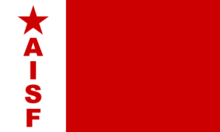 | |
| Abbreviation | AISF |
|---|---|
| Motto | Study & Struggle[1] |
| Formation | 12 August 1936, Lucknow, United Province, British Raj |
| Type | Student organisation |
| Purpose | Scientific socialism[2] |
| Headquarters | 4/7, Asaf Ali Road, New Delhi-110002, India [3] |
| Location | |
General Secretary | Vicky Mahesari |
President | Shuvam Banerjee |
Main organ | The Student |
| Affiliations | World Federation of Democratic Youth (WFDY), International Union of Students (IUS) |
| Website | www |
History
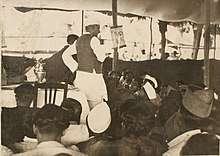
.jpg)
The foundation conference of the AISF was held in the Ganga Prasad Memorial Hall of Lucknow. 936 delegates from all over the country participated in the conference. The conference was inaugurated by Jawaharlal Nehru. In his presidential speech, M.A. Jinnah expressed happiness at the fact that people of different castes and communities had gathered in the conference with one common goal. The conference resolved to establish an All India Students Federation (AISF). Prem Narayan Bhargava was elected the first general secretary of the AISF. The Students’ Tribune became the first organ of the AISF.[6]
Hemu Kalani, an AISF leader, was arrested by the British army in 1942 for leading the Quit India Movement and he was publicly hanged in 1943 at the age of nineteen. AISF leader Kanaklata Barua was a martyrdom student who participated in the freedom struggle. AISF continued to fight for the cause of all India, until finally liberating Goa. The AISF played a huge role in completing the Kothari Commission report which is the basis for all the educational reforms in India.[1]
The slogan "Freedom, Peace and Progress", which had been raised since its formation, was amended at the 1958 National Convention. Since then, the AISF has come up with the slogan "Study & Struggle".[6] The AISF, which has constituents in 29 states, is campaigning against the commercialisation, racialisation, degradation of the education sector and for the protection of the public education. [1]
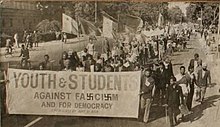
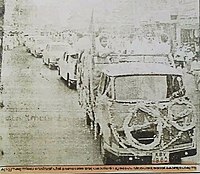
Motto and organisational structure
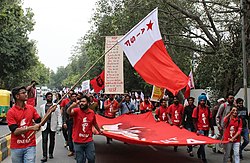
The organisation now works for the betterment of students with its focus on peace, progress and scientific socialism. It has the banner "Freedom, Peace, Progress."Study and Struggle is the motto of AISF.
AISF as an organisation has been continuously fighting for the issues faced by students and the society at large. In India the federation has organised several awareness programmes (dramas, street theatre performances, mimes, dance, short films, etc.) and mass rallies to address various social problems in states such as, West Bengal, Kerala, Punjab, Tamil Nadu, Andhra Pradesh, Telangana, Karnataka, Pondicherry, Uttar Pradesh, Odisha, Madhya Pradesh, Tripura, Gujarat, Manipur, Assam and Bihar.
The AISF has state committees in most states in India. The administrative structure of the federation is as follows:
- National executive body
- State executive body
- State administrative body
- District administrative body
- Block level committee
- Institutions level unions
AISF National Conferences
| National Conference | Year | Place |
|---|---|---|
| 1 (Founder Conference) | 12–13 August 1936 | Lucknow (Uttar Pradesh) |
| 2 | 22 November 1936 | Lahore |
| 3 | 1–3 January 1938 | Madras |
| 4 | 1–2 January 1939 | Calcutta |
| 5 | 1–2 January 1940 | Delhi |
| 6 | 25–26 December 1940 | Nagpur |
| 7 "Defense Convention" | 15 May 1942 | Delhi |
| 8 | 28–31 December 1944 | Calcutta |
| 9 | 20 January 1946 | Guntur |
| 10 | 3 January 1947 | Delhi |
| 11 | 29–31 December 1947 | Bombay |
| 12 | 23–27 July 1949 | Calcutta |
| 13 | 1–5 January 1953 | Hyderabad |
| 14 | 5–8 January 1955 | Lucknow |
| 15 | 2–4 January 1959 | Udaipur |
| 16 | 25–27 October 1961, but it could not be held due to natural disaster | Kanpur |
| 17 | 29 December 1965 – 2 January 1966 | Pondicherry |
| 18 | 21–23 December 1969 | New Delhi |
| 19 | 20 January 1974 | Cochin |
| 20 | 1–9 February 1979 | Ludhiana |
| 21 | 28–31 January 1983 | Trichy |
| 22 | 13–16 December 1985 | Guntur |
| 23 | 15–18 February 1991 | Bokaro |
| 24 | 7–9 February 1996 | Hyderabad |
| 25 | 18–21 October 2000 | Jalandhar |
| 26 | 3–6 January 2006 | Chennai |
| 27 | 13-15 February 2010 | Puducherry |
| 28 | 28–30 November 2013 | Hyderabad[7] |
| 29 | 27–30 September 2018 | Anantapur, Andhra Pradesh[8] |
General Secretaries
- Prem Narayan Bhargava
- Ansar Harvani
- M.L.Shah
- M. Farooqui
- Perin Bharucha
- Prashanta Sanyal
- Ali Jawad Zaidi
- Satyapal Dang
- Sukhendu Mazumdar
- D.P. Sabbarwal
- N.R. Dasari
- Hiren Dasgupta
- Suravaram Sudhakar Reddy
- Syed Azeez Pasha
- Amarjeet Kaur
- T. Laxminarayana
- Sony B Thengamam
- T. Srinivas
- Vijendra Kesari[7]
- Abhay Taksal
- Vishwajeet Kumar
- Vicky Maheshari (Present)[8]
Presidents
- Satyapal Dang
- Susheela Madiman
- Harish Chandra Tiwari
- B. Narsingha Rao
- Nautiyal
- Joginder Singh Dayal
- Bant Singh Brar
- Shambhu Sharan Shrivastava
- Atul Kumar Anjan
- Ravindra Nath Rai
- Rahul Bhaiji
- Ramakrushna Panda
- P. Muralidhar[7]
- Paramjit Dhaban
- Vali Ullah Khadri
- Shuvam Banerjee (Present)[8]
Present Leadership
In 29th National Conference held in September 2018 at Anantapur (Andhra Pradesh) Vicky Mahesari from Punjab was elected as New General Secretary and Shuvam Banerjee of West Bengal was elected as New National President of AISF.[9]
In JNUSU 2018–19, Amutha Jaydeep was elected joint secretary with huge majority.[10][11]
Notable leaders
- P K Vasudevan Nair - Former Kerala chief minister
- A B Bardhan - Former General secretary of Communist Party of India.
- C K Chandrappan - Parliamentarian
- I. K. Gujral - Former prime minister of India
- Suravaram Sudhakar Reddy - Former General secretary of Communist Party of India.
- D Raja - Present General secretary of Communist Party of India.
- Hemu Kalani - Sindh Freedom fighter and Student leader, who was hanged to death by British
- Satypal Dang - Former minister in the government of Punjab
- Atul Kumar Anjan - senior CPI leader and national secretary.
- Kanhaiya Kumar - Former President of the Jawaharlal Nehru University Students' Union and CPI National executive member.
- V. S. Sunil Kumar - Minister of Agriculture in Kerala
- Binoy Viswam - Former General secretary of AISF and Former minister in the Government of Kerala
- O.N.V Kurup – Malayalam poet & former leader
- Malayatoor Ramakrishnan – Malayalam writer & former leader
References
- http://dspace.lpu.in:8080/jspui/bitstream/123456789/3430/1/11312294_5_2_2015%201_15_01%20AM_full.pdf
- "AISF fought heroically for freedom | Hyderabad News - Times of India". The Times of India. Retrieved 4 January 2020.
- http://www.aisf.org.in. Missing or empty
|title=(help) - "History". All India Students Federation. Archived from the original on 10 June 2018. Retrieved 9 March 2019.
- "AISF fought heroically for freedom | Hyderabad News - Times of India". The Times of India. Retrieved 4 January 2020.
- "AISF has it genesis in Lucknow University | Lucknow News - Times of India". The Times of India. Retrieved 4 January 2020.
- "AISF Poised to Face New Challenges". Retrieved 4 January 2020.
- India, The Hans (24 September 2018). "All India Students Federation national convention on Sept 27". www.thehansindia.com. Retrieved 4 January 2020.
- "29th National Conference of All India Students Federation". ਭਵਿੱਖ - ਵਿਦਿਆਰਥੀਆਂ ਅਤੇ ਨੌਜੁਆਨਾਂ ਦਾ ਬੁਲਾਰਾ. 6 November 2018. Retrieved 14 July 2019.
- Chakorborty, Nabanita (16 September 2018). "JNUSU Election Results 2018: Left Unity bags four central panel posts, N Sai Balaji new president". News Nation. Retrieved 7 February 2020.
- Shobana, S (16 September 2018). "JNU Election Results Highlights: Left Unity Sweeps JNU Student Polls, Wins All Four Seats". NDTV.com. Retrieved 7 February 2020.
| Wikimedia Commons has media related to All India Students Federation. |